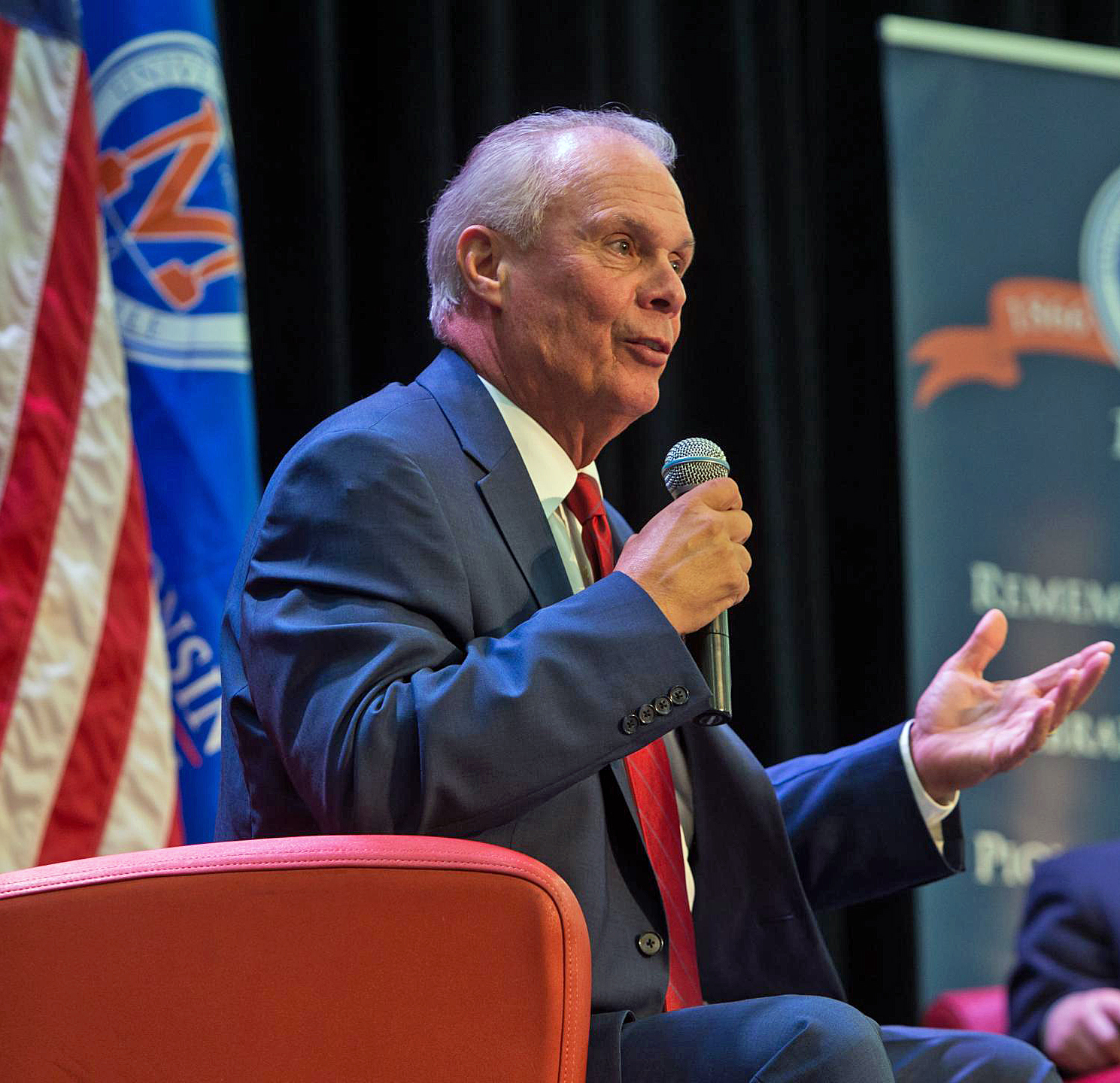State News: Redistricting, Budget Imbalance, Bo Ryan
- Share
- Tweet
- Pin
- Share
State Budget Projected to Have Large Imbalance
Gov. Scott Walker’s most recent budget is projected to have one of the largest spending imbalances of the past decade, according to a new report from the Wisconsin Taxpayers Alliance.
The imbalance was one of several trends identified in the report. Alliance director Todd Berry said the state is scheduled to spend $233 million more in 2019 than it generates in tax revenue.
“What that means going forward is that in 2019 when the Legislature and governor begin to budget, they will have an imbalance between what they’re spending and what they’re taking in and they’ll have to correct that in some way, either through spending cuts or tax increases or I’m sure they would prefer growth in the economy that would be good enough to churn out a little extra money,” Berry said.
Part of the reason for the imbalance was increased state spending on schools. Spending on K-12 schools in Walker’s most recent budget is scheduled to grow by eight percent. That’s more than it’s grown in any budget since former Democratic Gov. Jim Doyle’s first term — when it grew by nine percent in 2005.
Berry said a few other things are driving that growth in education spending, including increasing tax revenue and stabilized demand for state services like Medicaid.
Proposal Makes Redistricting a Piece of Cake
A new idea for ending partisan gerrymandering would have political parties divide up legislative boundaries like two people might slice up pieces of a cake.
The proposal, unveiled last month in a research paper by two professors at Carnegie Mellon University, would rely on the self-interest of Republicans and Democrats, who would take turns drawing districts and locking in legislative boundaries.
The approach is different from other efforts to reform redistricting, which often call for the creation of independent commissions to draw the lines.
The system Wesley Pegden, an associate professor of mathematical sciences, developed with Arial Procaccia, an associate professor of computer science, is based on the same principles as cutting a cake in a way that’s mathematically fair.
If there are two people, the first person cuts the cake and the second person chooses the first piece. The first person will cut the cake fairly so there’s a good piece left over when it’s their time to choose.
“This is envy-free in the sense that every player likes his own piece as much as he likes the other piece,” Procaccia said. “It turns out that redistricting has a similar flavor.”
Wisconsin’s current legislative map was drawn by Republicans in 2011 after they won control of both houses of the Legislature and the governor’s office after the last census in 2010. Wisconsin’s map has been at the center of the national discussion on redistricting. The U.S. Supreme Court heard arguments this year in a lawsuit that alleges Wisconsin Republicans were too partisan when they drew the map, and violated the constitutional rights of Democrats in the process. The court will likely issue a decision in Wisconsin’s case in the first half of 2018.
Report References Potential Pipeline Through State
A final report has been released on alternatives to using Enbridge Energy’s Line 5 to carry oil and natural gas under the Straits of Mackinac. Critics say the line with 64-year-old dual pipelines pose too great a risk to Michigan and the Great Lakes.
The alternatives outlined in the final report include replacing the line, using existing lines or constructing a new line potentially through Wisconsin.
Michigan hired independent research firm Dynamic Risk Assessment Systems in 2016 to review alternatives to transporting up to 540,000 barrels of oil and natural gas per day through Line 5 running from Superior through northern Michigan to Sarnia, Ontario.
Beth Wallace, pipeline safety consultant for the National Wildlife Federation, said Michigan residents would pay a few cents more at the gas pump and roughly 10 to 25 cents more for propane if Line 5 were decommissioned. The report outlined six alternatives to replace the line or take it out of service.
If Enbridge were to decommission Line 5 and build new, constructing a new pipeline through Wisconsin would be the most cost-effective option.
Michigan officials are accepting public comment on the report during the next month.
Milwaukee Has Most Expensive Hospitals in U.S.
A recent report ranked Milwaukee first for the most expensive hospitals in the United States among cities with 1 million or more residents. The analysis by Amino looked at health care provided at hospitals, imaging centers and urgent care centers and compared the cost for care.
This most recent analysis follows an October comparison in which Amino listed the most and least expensive hospitals in Milwaukee.
The findings showed Columbia St. Mary’s was the least expensive, 14 percent below the national average cost. Wheaton Franciscan Healthcare-St. Francis Hospital was the most expensive, 149 percent above the national average cost. The rankings include quality ratings by The LeapFrog Group, an advocate of hospital transparency.
Southeast Wisconsin has long had a reputation for high health care prices, something business leaders have tried to control since 2003 when they formed the Business Health Care Group.
Ex-Badgers Coach Inducted into Hall Of Fame

Bo Ryan speaks at UW-Platteville. Photo courtesy of UW-Platteville.
Former University of Wisconsin men’s basketball coach Bo Ryan was formally recognized in Kansas City last week as part of the 2017 class for the College Basketball Hall of Fame.
As part of this year’s inductees, Ryan was flanked by former collegiate stars including Tim Duncan and John Stockton, who later become great players in the NBA.
“This is why I came,” Ryan said. “So I can get all their autographs.”
But at the news conference with family and friends, Ryan had the biggest support group dressed in Badger red and recognizing him for 14 successful years with the Wisconsin Badgers.
Ryan was successful at UW-Platteville and UW-Milwaukee before his high-profile job as head coach of the Badgers. He said he appreciates the years he spent at UW-Platteville, where he guided the program to four Division III national titles.
In retirement these days, Ryan said he routinely attends Badgers homes games.
Wisconsin Public Radio, © Copyright 2017, Board of Regents of the University of Wisconsin System and Wisconsin Educational Communications Board.

